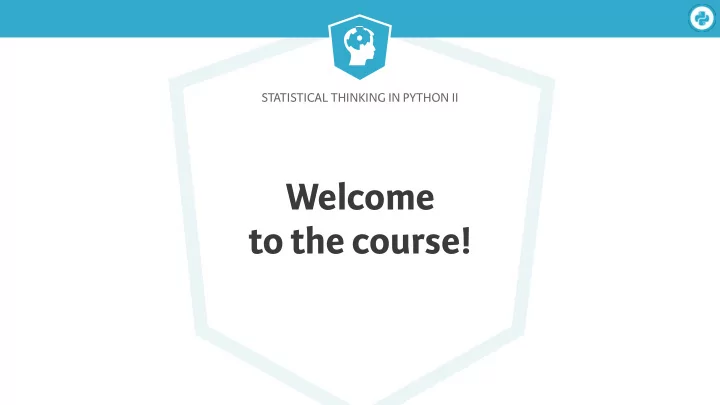

STATISTICAL THINKING IN PYTHON II Welcome to the course!
Statistical Thinking in Python II You will be able to… ● Estimate parameters ! a t a ● Compute confidence intervals d l a ● Perform linear regressions e r h t ● i Test hypotheses w
Statistical Thinking in Python II
Statistical Thinking in Python II We use hacker statistics ● Literally simulate probability ● Broadly applicable with a few principles
Statistical Thinking in Python II Statistical analysis of the beak of the finch Geospiza fortis Geospiza scandens Source: John Gould, public domain
STATISTICAL THINKING IN PYTHON II Let's start thinking statistically!
STATISTICAL THINKING IN PYTHON II Optimal parameters
Statistical Thinking in Python II Histogram of Michelson's measurements Data: Michelson, 1880
Statistical Thinking in Python II CDF of Michelson's measurements Data: Michelson, 1880
Statistical Thinking in Python II Checking Normality of Michelson data In [1]: import numpy as np In [2]: import matplotlib.pyplot as plt In [3]: mean = np.mean(michelson_speed_of_light) In [4]: std = np.std(michelson_speed_of_light) In [5]: samples = np.random.normal(mean, std, size=10000)
Statistical Thinking in Python II CDF of Michelson's measurements Data: Michelson, 1880
Statistical Thinking in Python II CDF with bad estimate of st. dev. Data: Michelson, 1880
Statistical Thinking in Python II CDF with bad estimate of mean Data: Michelson, 1880
Statistical Thinking in Python II Optimal parameters ● Parameter values that bring the model in closest agreement with the data
Statistical Thinking in Python II Mass of MA large mouth bass CDF for "optimal" parameters of a bad model Source: Mass. Dept. of Environmental Protection
Statistical Thinking in Python II Packages to do statistical inference scipy.stats statsmodels hacker stats with numpy Knife image: D-M Commons, CC BY-SA 3.0
STATISTICAL THINKING IN PYTHON II Let’s practice!
STATISTICAL THINKING IN PYTHON II Linear regression by least squares
Statistical Thinking in Python II 2008 US swing state election results Data retrieved from Data.gov (h � ps://www.data.gov/)
Statistical Thinking in Python II 2008 US swing state election results slope intercept Data retrieved from Data.gov (h � ps://www.data.gov/)
Statistical Thinking in Python II 2008 US swing state election results Data retrieved from Data.gov (h � ps://www.data.gov/)
Statistical Thinking in Python II Residuals residual Data retrieved from Data.gov (h � ps://www.data.gov/)
Statistical Thinking in Python II Least squares ● The process of finding the parameters for which the sum of the squares of the residuals is minimal
Statistical Thinking in Python II Least squares with np.polyfit() In [1]: slope, intercept = np.polyfit(total_votes, ...: dem_share, 1) In [2]: slope Out[2]: 4.0370717009465555e-05 In [3]: intercept Out[3]: 40.113911968641744
STATISTICAL THINKING IN PYTHON II Let’s practice!
STATISTICAL THINKING IN PYTHON II The importance of EDA: Anscombe's quartet
Statistical Thinking in Python II Anscombe's quartet Data: Anscombe, The American Statistician , 1973
Statistical Thinking in Python II Anscombe's quartet Data: Anscombe, The American Statistician , 1973
Statistical Thinking in Python II Anscombe's quartet Data: Anscombe, The American Statistician , 1973
Statistical Thinking in Python II Anscombe's quartet Data: Anscombe, The American Statistician , 1973
Statistical Thinking in Python II Anscombe's quartet Data: Anscombe, The American Statistician , 1973
Statistical Thinking in Python II Look before you leap! ● Do graphical EDA first
Statistical Thinking in Python II Anscombe's quartet Data: Anscombe, The American Statistician , 1973
Statistical Thinking in Python II Anscombe's quartet Data: Anscombe, The American Statistician , 1973
Statistical Thinking in Python II Anscombe's quartet Data: Anscombe, The American Statistician , 1973
Statistical Thinking in Python II Anscombe's quartet Data: Anscombe, The American Statistician , 1973
STATISTICAL THINKING IN PYTHON II Let’s practice!
Recommend
More recommend